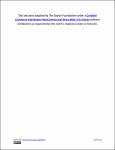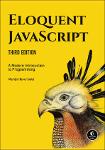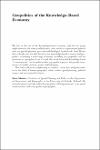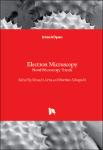Tìm kiếm
Tác giả
- Jorgensen, Ed (3)
- McFadyen, Ron (3)
- Gittell, Ross (2)
- Köhn, Doris (2)
- Sau >
Chủ đề
- kinh tế (16)
- Economics (9)
- programming (8)
- Management science (7)
- Sau >
Năm xuất bản
- 2019 (25)
- 2016 (24)
- 2018 (18)
- 2015 (14)
- 2017 (12)
- 2012 (11)
- 2011 (7)
- 2013 (7)
- 2010 (6)
- 2014 (5)
- Sau >
Toàn văn
Kết quả tìm kiếm
"We set out to design an introductory course governed by four themes:
Give students a good idea of what a career in MIS looks like by doing MIS.
Enhance the professionalism of deliverables by teaching design and usability concepts.
Promote creativity by assigning projects that demand it.
Teach students about cloud computing by having them do cloud computing.
Students in an introductory Management Information Systems (MIS) course often ask what a career in MIS looks like. Lacking a clear vision, they make their own assumptions. Often they assume the career involves programming with little human interaction. That MIS is a technical field could not be further from the truth. MIS job descriptions typically require candidates to be able to collaborate, communicate, analyze needs a... |
JavaScript lies at the heart of almost every modern web application, from social apps like Twitter to browser-based game frameworks like Phaser and Babylon. Though simple for beginners to pick up and play with, JavaScript is a flexible, complex language that you can use to build full-scale applications.
This much anticipated and thoroughly revised third edition of Eloquent JavaScript dives deep into the JavaScript language to show you how to write beautiful, effective code. It has been updated to reflect the current state of Java¬Script and web browsers and includes brand-new material on features like class notation, arrow functions, iterators, async functions, template strings, and block scope. A host of new exercises have also been added to test your skills and keep you on trac... |
Sustainable development is the 21st Century's wicked problem. After 40 years into this agenda have reversed only few unsustainable trends we hear the call for aparadigm shift, transformation, radical change or system innovations in order to finally change course. But what does this actually mean? And how do we put it into practice? This book describes the path ahead. It combines system transformation research with political economy and change leadership insights when discussing the need for a great mindshift in how human wellbeing, economic prosperity and healthy ecosystems are understood if the Great Transformations ahead are to lead to more sustainability. It shows that history is made by purposefully acting humans and introducestransformative literacy as a key skill in leading th... |
We live in the era of the knowledge-based economy, and this has major implications for the ways in which states, cities and even supranational political units are spatially planned, governed and developed. In this book, Sami Moisio delves deeply into the links between the knowledge-based economy and geopolitics, examining a wide range of themes, including city geopolitics and the university as a geopolitical site. This book will prove enlightening to students, researchers and policymakers in the fields of human geography, urban studies, spatial planning, political science, and international relations. |
"I never seemed to find the perfect data-oriented Python book for my course, so I set out to write just such a book. Luckily at a faculty meeting three weeks before I was about to start my new book from scratch over the holiday break, Dr. Atul Prakash showed me the Think Python book which he had used to teach his Python course that semester. It is a well-written Computer Science text with a focus on short, direct explanations and ease of learning.The overall book structure has been changed to get to doing data analysis problems as quickly as possible and have a series of running examples and exercises about data analysis from the very beginning.
Chapters 2–10 are similar to the Think Python book, but there have been major changes. Number-oriented examples and exercises have been ... |
TEM and SEM have contributed greatly to the progress of various research fields, which has been accelerated in the last few decades by highly functional electron microscopes and microscopy. In this tide of microscopy, various microscopic methods have been developed to make clear many unsolved problems, e.g. pulse beam TEM, environmental microscopy, correlative microscopy, etc. In this book, a number of reviews have been collected concerning these subjects. We think that the content in each chapter is impressive, and we hope this book will contribute to future advances in electron microscopy, materials science, and biomedicine. |
This Edited Volume is a collection of reviewed and relevant research chapters, offering a comprehensive overview of recent developments in the field of Quantum Electronics. The book comprises single chapters authored by various researchers and edited by an expert active in the field. All chapters are complete in itself but united under a common research study topic. This publication aims at providing a thorough overview of the latest research efforts by international authors on Quantum Electronics, and open new possible research paths for further novel developments. |
Made in Africa presents the findings of original field research into the design, practice, and varied outcomes of industrial policy in different sectors in Ethiopia. The book explores how and why the outcomes of industrial policy are shaped by particular factors in different industries. The findings are discussed against the backdrop of ‘industrial policy’, which has recently found renewed favour among economists and international organizations, and of the history of thought about and practice in industrialization. The book seeks to learn from the failures and successes in the cement, leather and leather products, and floriculture sectors, all of them functioning under the umbrella of a single industrial strategy. Moreover, it argues that success lies in the interactions among polic... |
Part I: A power and systems approach: Systems thinking changes everything, Power lies at the heart of change, Shifts in social norms often underpin change. Part II: Institutions and the importance of history: How states evolve, The machinery of law, Accountability, political parties, and the media, How the international system shapes change, Transnational corporations as drivers and targets of change. Part III: What activists can (and can’t) do: Citizen activism and civil society, Leaders and leadership, The power of advocacy. Part IV: Pulling it all together: A power and systems approach to making change happen. |
This open access book asks why and how some of the developing countries have “emerged” under a set of similar global conditions, what led individual countries to choose the particular paths that led to their “emergence,” and what challenges confront them. If we are to understand the nature of major risks and uncertainties in the world, we must look squarely at the political and economic dynamics of emerging states, such as China, India, Brazil, Russia, and ASEAN countries. Their rapid economic development has changed the distribution of wealth and power in the world. Yet many of them have middle income status. To global governance issues, they tend to adopt approaches that differ from those of advanced industrialized democracies. At home, rapid economic growth and social changes put... |










